KARACHI: In 1954, Muhammad Riaz set up a bookstore in Karachi, just around the corner from the delectable aromas and crowded pathways of the famous Burns Road food street.
Over the next three quarters of a century, a cavernous market of overflowing bookstores and stalls mushroomed all around Maktaba-e-Imran Digest Publishing and came to be called Urdu Bazaar. Today, it is a well-known city landmark, a sprawling space whose history mirrors the cultural development of Karachi itself and which offers a glimpse into the soul and workings of Pakistan’s chaotic financial hub.
But the bazaar’s fate has been uncertain since earlier this month when nearly 70 shopkeepers were informed by the Karachi Metropolitan Corporation (KMC) that they had to vacate their shops by January 8 or face forceful eviction.
The notice is part of a larger anti-encroachment drive launched by authorities last year following the orders of the Supreme Court to demolish illegal structures built on drains, pavements and state land. Since December 21, more than 3,500 shops have been demolished, directly affecting at least 17,500 workers. Hundreds of sunshades, extended walls, huts, hotels, cabins, street markets, marriage halls and banquets have also been razed to the ground in all six districts of the seaside city of 1.7 million.
For now, the anti-encroachment operation against the historic bazaar has been postponed due to protests by vendors and merchants, and a four-member committee has been set up to decide whether the market runs over a nullah, or drain.
Karachi mayor Waseem Akhtar said he was taking action against encroachers as per the law. “None of our actions are illegal,” he told Arab News at his office. “We are bound to implement the [Supreme] Court’s orders.”
But 70-year-old store manager Mahmood Ahmed said the bazaar was set up following legal procedures and that KMC had itself invited traders to the area in the fifties and asked them to set up their businesses there.
“We haven’t encroached,” the bespectacled shop owner told Arab News at Maktaba-e-Imran Digest Publishing, which he manages since his brother-in-law Riaz passed away. “Everything here was legal but with this notice we suddenly came to know we have no right to stay at a place which we developed into a centre of learning.”
When the subcontinent was divided in 1947, Pakistan made Urdu, the elegant, supple language associated with poets and emperors, her official language. The language was popularised by Muhajirs, mostly Muslim immigrants who arrived from various regions of India, were widely identified as native Urdu speakers and settled in parts of urban Sindh, including Karachi. Indeed, many of those who first opened bookshops in what is currently Urdu Bazaar were Urdu speakers, lending the market its name. Soon, the place became a regular haunt for poets and authors like Mushtaq Yousufi, Ibne Insha, Shaukat Thanvi, Jaun Elia and others -- and the rest as they say is history.
The bazaar’s groaning bookshelves and stalls culled from discarded pallets are a stone’s throw from heritage buildings like Radio Pakistan, the Sindh provincial parliament and the Supreme Court, in the heart of what is called Old Karachi. The area is a churning hive of shops, food stalls, street vendors, taxi drivers, rag pickers, and more. It’s narrow, teeming alleyways are alive with commerce. But as far as city authorities are concerned, this pulsating stretch of land is an emblem of everything that is wrong with the city.
“The objective [of the demolition] is to rob high-value space from where the poor are located and use it for the benefit of the rich and the speculators who serve them,” top architect Arif Hasan wrote in an op-ed in Dawn newspaper last year. “It is to replace hawkers and indigenous markets with malls and high-end retail outlets. That they can coexist...is beyond the comprehension of a paranoid elite and enemies of a multi-class city. “
By 2030, Karachi is expected to be the world’s third most populated city. The city is a planner’s nightmare and in theory, the anti-encroachment operations are meant to correct decades of failed urban development.
But plans to raze Urdu Bazaar threaten the very “social and cultural face of Karachi,” said Sahar Ansari, an Urdu poet and linguist.
“Urdu bazaar is the educational, literary and cultural face of Karachi and erasing the bazaar will be tantamount to erasing this very identity,” he said. “I have visited book bazaars in more than fifteen cities of Europe, Middle East, South and East Asia, which have played a great role in transforming those societies. How can we demolish ours which we Karachiites need the most today?”
Indeed, the market has become a temple for Karachi’s literary pilgrims, poets, writers, students of all ages, publishers and paper and stationary sellers. Some visitors are bibliophiles who come to immerse themselves in age-old tomes buried in tiny bookstores. Others are just browsing for textbooks or self-help manuals on meandering stalls that line the edge of the streets.
All around, the view is pure Karachi: the crowds, like in the rest of the city, are raucous and dense and the juxtapositions are jarring. A box set of works by Urdu prose writer Saadat Hasan Manto rubs shoulders with the biography of cricket star and current Pakistani Prime Minister Imran Khan. The historical fiction novel, Memoirs of a Geisha, sits atop a slippery stack of paperbacks about the Atkins diet. Rickety stalls piled high with fashion magazines are pressed up against concrete plaza buildings. Well-dressed university students buy textbooks from elderly bearded men who have grown old running their shops in Urdu Bazaar.
The bazaar’s literary torch is perhaps best represented by Faridi Publications whose 96-year-old founder set up the shop in 1980. Today, he runs it with his 62-year-old son Nazar Muhammad Faridi and 28-year-old grandson Osama Faridi, the three generations of men spending each day together among eager customers and a passel of books.
“This is not only monetary homicide for us,” Faridi said as he put an Urdu magazine in a shopping bag and handed it to be customer. “But they [KMC] are also robbing us of the memories of three generations attached to this old market.”
“We have paid our rents on time and now, after all these years, we are being asked to vacate,” Faridi’s son said as the sun set over the crowded street. “They want to rob us of everything. Our livelihood and our lovely memories.”
To tame Karachi’s architectural anarchy, a vintage book market may be felled
To tame Karachi’s architectural anarchy, a vintage book market may be felled
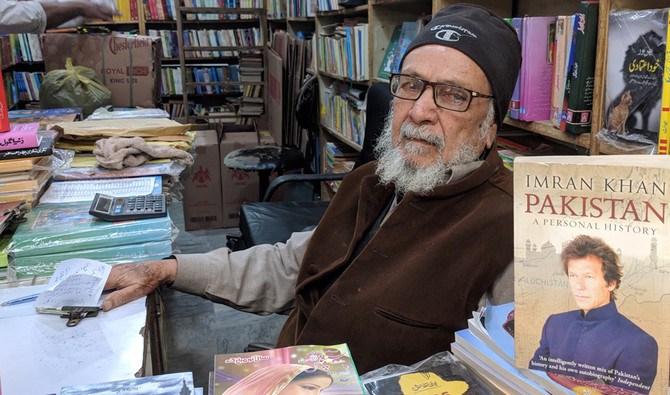
- Urdu Bazaar slated to be next victim of anti-encroachment drive
- Shopkeepers fear a centre of learning and culture may soon be lost
Elephant Madhubala to be shifted to Karachi’s Safari Park in May— state media
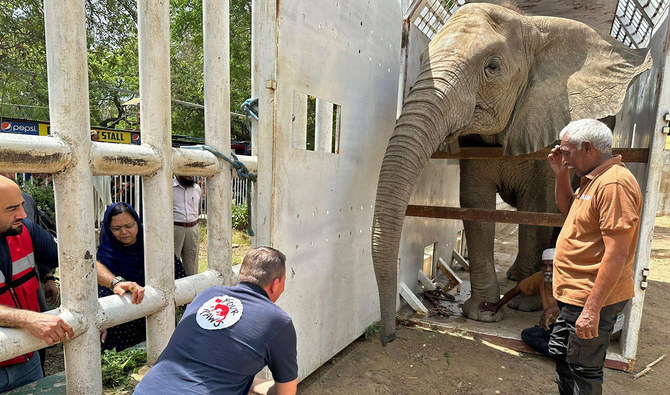
- Madhubala has been in solitary confinement since April 2023 when her companion, elephant Noor Jehan, died
- International animal rights organization warns solitary confinement has taken a toll on Madhubala’s mental health
ISLAMABAD: Pakistani elephant Madhubala, who has been in solitary confinement at Karachi Zoo since last year, will be shifted to Karachi’s Safari Park in May where she will be in the company of two other elephants, state-run media Associated Press of Pakistan reported on Thursday.
Madhubala, one of only three captive elephants alive in Pakistan, was brought to the South Asian country with three other elephants from Tanzania in 2009. However, has been in solitary confinement at Karachi Zoo since April 2023 after her companion, elephant Noor Jehan passed away from illness.
International animal rights organization FOUR PAWS, which has been involved in efforts to have Madhubala relocated to Karachi Safari Park, said last week the solitary confinement has taken a strong toll on her mental condition, with boredom being her biggest stressor.
Animal rights activists have long campaigned against the plight of animals in Pakistan, especially elephants, and demanded they be shifted to “species-appropriate” locations such as the Safari Park.
“According to Zoo administration, the arrangements for the transfer have been completed,” APP said. “Madhubala will join two other elephants, Sonia and Malika after relocation to Safari Park.”
A FOUR PAWS spokesperson said the organization was thrilled to see Madhubala finally getting the treatment she deserves.
“Her story is a testament to the power of collaboration and the importance of animal welfare,” the spokesperson was quoted as saying by APP.
FOUR PAWS says the elephant enclosures at Safari Park would have water elements for bathing, skincare and thermoregulation. Enrichments such as hay nets, varying substrates like soil, sand, clay, and sawdust will be provided for Madhubala to dust bathe while the area is secured by elephant-proof fencing.
Madhubala will be carried from the Karachi Zoo to the Safari Park in a huge transport crate. The elephant is currently being trained to enter and exit the crate by herself and sit inside it.
‘Politically motivated’: Pakistan rejects US State Department report on rights abuses
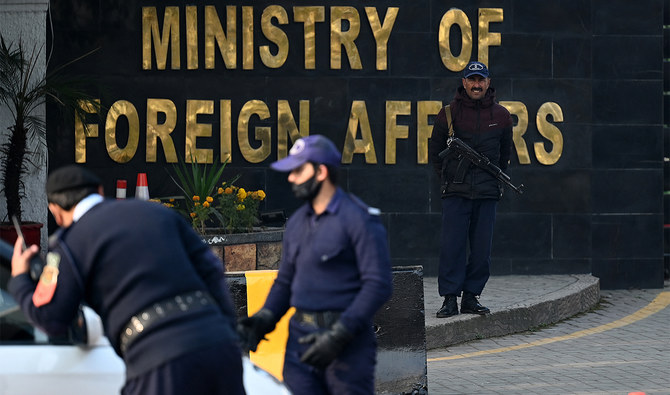
- Annual assessment identified arbitrary detentions, extrajudicial killings, enforced disappearances
- Pakistan government and state agencies deny involvement in missing persons cases, other rights abuses
ISLAMABAD: Pakistan said on Thursday it “categorically” rejected the 2023 country report on human rights practices issued by the US State Department, saying the report was politically motivated, lacking in objective evidence and followed an agenda of “politicization of international human rights.”
The annual human rights assessment released earlier this week identified arbitrary killings, extrajudicial killings, enforced disappearance, torture and “cases of cruel, inhuman, or degrading treatment or punishment by the government or its agents” in Pakistan last year.
The report also said the government “rarely took credible steps” to identify and punish officials who may have committed rights abuses.
“The contents of the report are unfair, based on inaccurate information and are completely divorced from the ground reality,” the Pakistani foreign office said in a statement, adding that the assessment used a “domestic social lens to judge human rights in other countries in a politically biased manner.”
“This year’s report is once again conspicuous by its lack of objectivity and politicization of the international human rights agenda. It clearly demonstrates double standards thus undermining the international human rights discourse.”
The foreign office said it was “deeply concerning” that a report purported to highlight human rights issues around the world was ignoring or downplaying the “most urgent hotspots of gross human rights violations” like Gaza and Kashmir. It also called on the US demonstrate the “requisite moral courage” to speak the truth about all situations and play a constructive role in supporting international efforts to end human rights violations.
“In line with its constitutional framework and democratic ethos, Pakistan remains steadfast in its commitment to strengthen its own human rights framework, constructively engage to promote international human rights agenda, and uphold fairness and objectivity in the international human rights discourse,” the FO added.
Political leaders, rights groups and families of victims have long accused the government, the army and intelligence agencies of being behind cases of arbitrary detentions, extrajudicial killings and enforced disappearances, among other rights abuses. Families say people picked up by security forces on the pretext of fighting militancy or crime often disappear for years, and are sometimes found dead, with no official explanation. Pakistani state agencies deny involvement in such cases.
On Tuesday, Pakistan’s law minister said the government would reconstitute a committee to address enforced disappearances, hours after the release of the US report.
“Now the work is being initiated on this again on the directives of the prime minister. A committee is going to be reconstituted, there will be parliamentary presence in that committee,” Law Minister Azam Nazeer Tarar said.
“There is no lack of seriousness on the government’s part to resolve this issue.”
Pakistani court bars ex-PM Khan, wife from issuing statements against state institutions
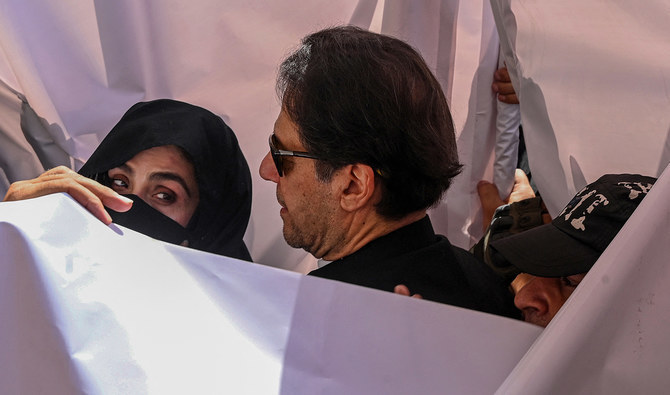
- Accountability court directs media personnel to confine reporting to proceedings of the trial only
- Khan widely believed to have fell out with army, leading to ouster from PM office in 2022
ISLAMABAD: A Pakistani accountability court judge recently barred former prime minister Imran Khan and his wife, Bushra Bibi, from issuing “derogatory” or “inflammatory” statements against state institutions and their officials.
Khan, who was PM from 2018-2022, remains jailed in multiple cases, including a 14-year jail sentence for him and his wife for the illegal sale of state gifts. Khan was first imprisoned after being handed a three-year prison sentence in August 2023 by the Election Commission for not declaring assets earned from selling gifts worth more than 140 million rupees ($501,000) in state possession and received during his premiership. In January, Khan and wife Bushra Bibi were handed 14-year jail terms following a separate investigation by the country’s top anti-graft body into the same charges involving state gifts.
Khan blames Pakistan’s powerful military, which has ruled the country directly for over 30 years, for colluding with his rivals to remove him from office via a parliamentary vote in April 2022 and subsequently cracking down on his supporters. The military denies his accusations and has repeatedly said it does not interfere in political matters.
On Friday, accountability court judge Nasir Javed Rana heard Khan’s petition requesting a fair trial. The PTI founder had sought the removal of glass and wooden structures erected at the Central Prison in Rawalpindi, where an appeal against his conviction is being heard. He had also alleged that reporters were not being allowed to attend proceedings, saying that the actions violated the principles of an open trial ordered by the court.
“The accused persons shall refrain from making any political, inflammatory and/or derogatory statements vis-a-vis state institutions and the officials insinuating anything to them,” a copy of the order, seen by Arab News that emerged on Thursday, read.
“The media personnel shall confine their reporting to the proceedings of the trial and shall not publish/report any statements in the trial proceedings, as witness or as counsel,” it added.
Khan’s convictions mean he is banned from holding public office and ruled the 71-year-old out of general elections earlier this year. Arguably Pakistan’s most popular politician, Khan says all cases against him are motivated to keep him out of politics.
Tensions between Khan and the military escalated in May 2023, when angry supporters of his party took to the streets in response to his brief detention, and torched government buildings and ransacked military installations in many parts of the country.
The army cracked down on Khan’s supporters and leaders following the attacks. Khan denied he had incited his supporters to protest violently, saying he was in detention when they erupted.
Pakistan eye comeback against New Zealand in fourth T20I today
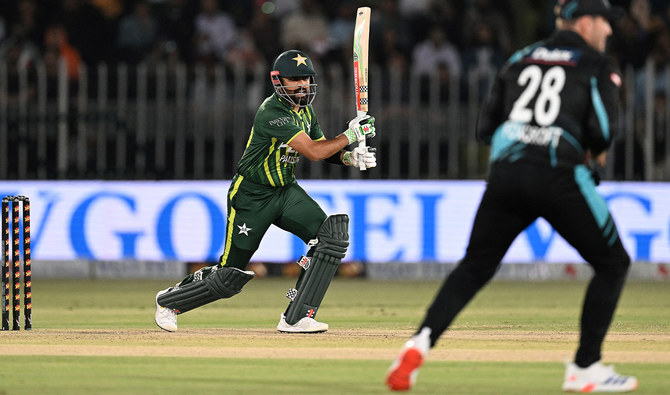
- A second-string New Zealand squad beat Pakistan by seven wickets on Sunday in Rawalpindi
- Skipper Babar Azam says pacers Shaheen Shah Afridi, Naseem Shah have ability to make comeback
ISLAMABAD: Pakistan will be eyeing a comeback today, Thursday, in the fourth match of the T20I series against New Zealand in Lahore after suffering a defeat at the hands of a second-string Kiwi squad last week.
Pakistan will head into today’s match against Michael Bracewell’s squad without star batter and wicketkeeper Muhammad Rizwan, who has been pulled from the series after he felt discomfort in his right hamstring.
New Zealand are missing key players including Trent Boult and skipper Kane Williamson as they opted to play in the lucrative Indian Premier League (IPL) while pulled out of the Pakistan series due to injuries.
Despite that, the Kiwis managed to beat Pakistan on Sunday by seven wickets in Rawalpindi, shocking the 2009 T20I world champions on their own turf.
“We did not lose because of any two or three players,” Pakistan captain Babar Azam said at a press conference in Lahore on Wednesday night. “We lost as a team. In the batting, bowling and fielding [areas] we did collapse a little.”
Pakistan’s premium fast bowlers Naseem Shah and Shaheen Shah Afridi failed to impress against New Zealand in the third T20I. However, Azam backed both bowlers, describing them as Pakistan’s “best” bowlers.
“They know how to make a comeback, even if it [bad performance] happens in one game. It is part of life,” he said. “It can’t happen that one person performs every single day.”
The series is an important one for both sides as they gear up for the ICC T20 World Cup 2024 in the West Indies and USA scheduled to be held in June.
The last match of the Pakistan-New Zealand series will be played in Lahore on May 27. Pakistan and New Zealand have both won one match against each other so far, with the first T20I fixture washed away by rain.
The match begins at 7:30 p.m. Pakistan Standard Time.
Pakistan suffered more from Afghan ‘imbroglio’ than wars with India — special envoy to Kabul
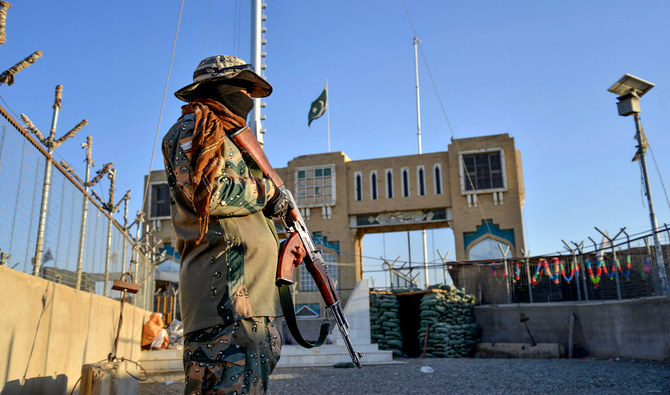
- Ambassador Durrani hopes Pakistan will overcome security threats from Afghanistan through diplomacy
- He warns of growing hostilities in the Middle East, saying the Iran-Israel conflict can engulf the region
ISLAMABAD: Pakistan’s Special Representative for Afghanistan Ambassador Asif Durrani acknowledged that his country had suffered a great deal more due to the volatility in its northwestern neighborhood than its recurrent wars in the east with nuclear-armed India while addressing a conference on Wednesday.
Durrani issued the statement during a penal discussion at the Institute of Strategic Studies Islamabad while sharing a broad overview of his country’s threat perception. Pakistan blamed the administration in Kabul last year in November for not doing enough to address its security concerns by clamping down on militants operating from Afghanistan.
It even maintained there was enough evidence that Afghan authorities were “facilitating” attacks launched by the Tehreek-e-Taliban Pakistan (TTP) against its people and security forces. Subsequently, Pakistan started deporting “illegal immigrants,” mostly Afghans, from its cities while citing security reasons.
“Afghanistan has become a permanent fixture in Pakistan’s regional paradigm for over four decades,” Durrani told the gathering. “In terms of blood and treasure, Pakistan has suffered more due to the Afghan imbroglio than its three wars with India.”
“Over 80,000 Pakistanis have died in the past two decades during the so-called war on terror,” he continued. “The country is still counting its dead and injured. After the withdrawal of the NATO forces, it was hoped that peace in Afghanistan would bring peace in the region. However, such expectations were short-lived.”
Durrani maintained that TTP attacked had increased by 65 percent after the departure of international forces while suicide bombings had shot up by 500 percent.
“The TTP’s enhanced attacks on Pakistan while using Afghan soil have been a serious concern for Pakistan,” he said. “Another worrying aspect is the participation of Afghan nationals in these attacks.”
He hoped that his country would overcome threats emerging from Afghanistan through diplomatic means, though he warned of the rising tensions in the Middle East while pointing out that the Iran-Israel conflict, if not contained, could engulf the whole region.
“Pakistan will also suffer,” he added.
Durrani said the estimated economic cost suffered by his country since the US-led “war on terror” was somewhere around $150 billion.
















